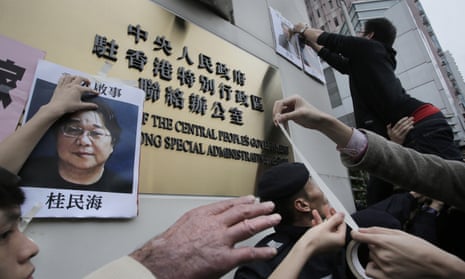China has attempted to deflect international criticism over its alleged abduction of the Swedish bookseller Gui Minhai by insinuating that two Swedish diplomats who were with him when he was taken had violated unspecified laws.
Gui, a Hong Kong publisher who dealt in melodramatic tomes about China’s political elite, was taking a train to Beijing on Saturday morning, apparently to attend a medical examination at the Swedish embassy, when he was detained by about 10 plainclothes officers.
It was the second time in just over two years that Gui, 53, had been seized by Chinese agents. In October 2015, he vanished from his Thai holiday home, later resurfacing in detention in China where he made what supporters denounced as a forced televised confession. Gui had seemed on the verge of release last autumn. Reports at the time had said he was “half-free” and living under surveillance, but this week’s development has shattered hopes that he would be properly freed.
On Tuesday, China’s foreign ministry spokeswoman, Hua Chunying, faced a barrage of questions over Gui at a press briefing in Beijing, held as Sweden’s foreign minister, Margot Wallström, summoned China’s ambassador over the incident.
Hua said she had no information about the missing bookseller’s case, claiming it was outside of the foreign ministry’s remit. She urged reporters to contact “the competent authorities” but declined to say who they were. “I don’t see what the point of asking this question is,” she told journalists.
Pressed on whether China’s public security ministry could shed light on Gui’s whereabouts, Hua asked a reporter from the New York Times: “What do you think? How long have you been in China?”
She also hinted that the Swedish diplomats who were with Gui when he was taken had committed an unspecified offence. “We hope that any foreigners in China, including foreign diplomats, can observe international and Chinese laws.”
Sweden’s foreign ministry offered no immediate response to that suggestion but confirmed Wallström had received China’s ambassador on Tuesday after telling reporters Sweden had detailed knowledge of Saturday’s events and was “working round the clock” on the issue. “The situation has now worsened since Saturday morning,” Wallström admitted.
Criticism of China’s actions – and Stockholm’s so far timid public response to Gui’s ordeal - intensified after reports of his latest detention. “This was precisely what wasn’t supposed to happen,” the bookseller’s daughter, Angela Gui, told the Guardian.
“I think it is quite clear that he has been abducted again and that he’s being held somewhere at a secret location,” she added in an interview with Radio Sweden.
In an editorial entitled “Is there anything China won’t get away with?”, Sweden’s Borås Tidning newspaper said it was time to stand up to a bullying Beijing: “The scariest part of the news about the Swedish publisher isn’t so much that Chinese authorities have caught him again but the arrogance the manner of his arrest demonstrates to the rest of the world.”
It said: “This is a new China that we see; a China which, with its ever-growing tentacles, wants to build a huge port in Lysekil [in Sweden] … which builds nuclear power plants in the UK, which wants to build an Arctic highway from Norway to Moscow … a China that is not afraid of the diplomatic repercussions that may arise from grabbing a Swedish book publisher in front of the employees of Margot Wallström.”
Diplomats and observers say that under Xi Jinping Beijing has become increasingly deaf to foreign criticism, wagering cash-hungry governments will not challenge its actions.
“There is really a new, harsher tone in their approach. It wasn’t like this a few years ago,” said one western diplomat who declined to be named.
“I think they’ve become over-confident and are overplaying their hand,” the diplomat added. “And there is an increasing pushback from all over the world.”
